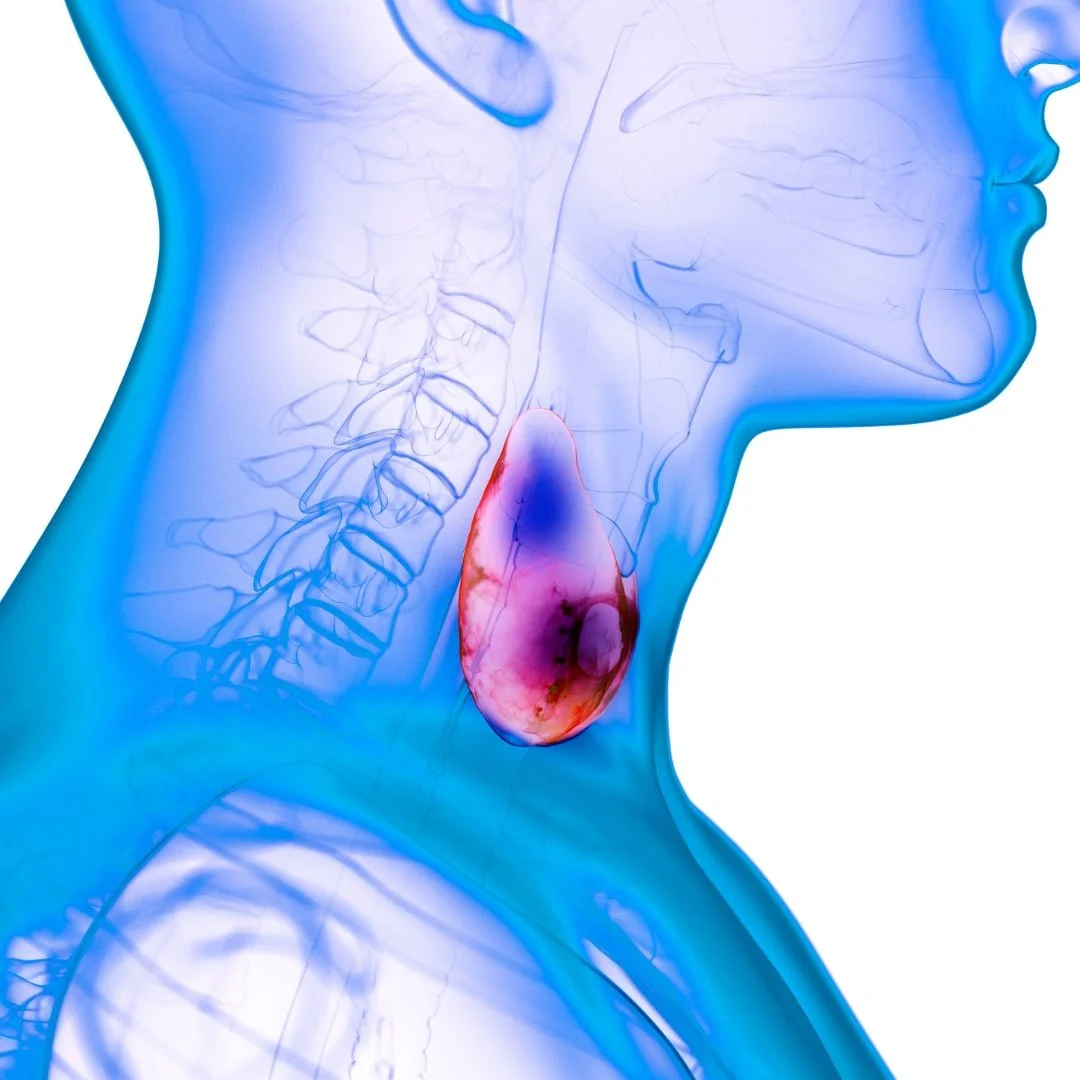A Natural Approach to Treating Thyroid Disease
How the Thyroid Works
The thyroid is a small, butterfly-shaped gland located in the front of your neck.
It produces the hormones T4 (thyroxine) and T3 (triiodothyronine), which help regulate metabolism, growth, body temperature, heart rate, digestion, energy levels, and more.
The production of thyroid hormones is controlled by thyroid-stimulating hormone (TSH), released by the pituitary gland; it's a feedback loop: when T4/T3 are low, TSH increases to drive more production, and vice versa.
Types & Causes of Thyroid Disease
There are multiple forms of thyroid dysfunction, often grouped into hypothyroidism (underactive), hyperthyroidism (overactive), nodules or enlargement (goiter), inflammation (thyroiditis), and thyroid cancer.
Some common causes include:
Autoimmune disease (most common), such as Hashimoto’s thyroiditis (leading to hypothyroidism) or Graves’ disease (leading to hyperthyroidism).
Thyroiditis — inflammation of the gland; may be temporary or long term.
Iodine deficiency or excess.
Surgery, radiation, medications that damage or remove part of the thyroid.
Genetic / congenital causes — being born with thyroid that doesn’t function correctly.
Other triggers: pregnancy and postpartum changes, certain infections, exposure to environmental toxins, etc.
Symptoms
Because thyroid hormones affect nearly every system of the body, symptoms of both over- and under-activity can be wide-ranging. Some people have mild or vague symptoms; others more pronounced.
Symptoms of hypothyroidism (underactive thyroid):
Fatigue, feeling cold, slowed heart rate
Weight gain, constipation, dry skin
Hair thinning or hair loss, muscle weakness, low energy
Mental sluggishness, depression, difficulty concentrating
Symptoms of Euthyroid:
is a temporary condition where thyroid hormone levels appear low but thyroid function is still normal. It can be early stages of hypothyroidism or can happen as sequalae after severe illness or surgery, starvation, malnutrition, infections or some medications. This requires monitoring to confirm it is temporary or a progressing hypothyroidism.
Symptoms of hyperthyroidism (overactive thyroid):
Unintentional weight loss, rapid heartbeat, feeling hot, sweating
Nervousness, irritability, tremor, anxiety
Increased appetite, frequent bowel movements, heat intolerance
Weak muscles, thinning hair, sleep disturbances
Other possible signs: goiter (visible enlargement of the thyroid), nodules or lumps in the neck, changes in cholesterol levels, irregular menstrual cycles, effects during pregnancy.
Diagnosis
Diagnosing thyroid disease usually involves several steps:
Medical history & physical exam — evaluating symptoms, family history, changes in weight, energy, mood, etc.
Blood tests, including TSH, T4 & free T4, T3 & free T3; sometimes tests for thyroid antibodies (TPOAb, TgAb, TRAb) and/or rT3.
Imaging or scans, when needed — ultrasound for nodules, radioactive iodine uptake in hyperthyroid cases.
Special tests for thyroiditis if inflammation is suspected.
Complications & Why Treatment Matters
If untreated or poorly managed, thyroid disease can lead to complications including:
Cardiovascular problems (high cholesterol, arrhythmias, heart disease)
Bone loss / osteoporosis (especially with hyperthyroidism or overtreatment in hypothyroidism)
Mental health effects: depression, anxiety, cognitive slowing
Effects on fertility, pregnancy complications
In severe cases, myxedema coma (hypothyroid crisis) or thyroid storm (hyperthyroid crisis) — both rare but medical emergencies
Treatment & Management
Treatment depends on what type of thyroid disease you have, its severity, how long it’s been present, and how it is affecting your health. Management often combines medical therapies, lifestyle changes, and monitoring.
Living Well & Prevention
While some causes of thyroid disease aren’t controllable (genetics, some autoimmune triggers), there are steps people can take to support thyroid health or reduce severity:
Eat a balanced diet with sufficient iodine (but avoid excessive iodine) and other thyroid-supporting nutrients like selenium, zinc.
Avoid environmental toxins (e.g. certain chemicals or radiation exposures).
Monitor for symptoms, especially if there is family history of thyroid disease or other autoimmune disorders.
Maintain a healthy weight, manage stress, get adequate sleep.
In cases of known risk (pregnancy, postpartum), have thyroid checked as needed.
How We Approach Thyroid Disease
At East West Wellness, we specialize in optimizing thyroid function by addressing the root causes of imbalance. Our approach focuses on reducing inflammation, supporting nutrient repletion, and correcting oxidative stress and DNA damage. We begin with thorough diagnostic testing, including comprehensive thyroid panels and antibody profiles, to uncover inflammation or autoimmune dysfunction. Of course, if you have those test results, we encourage you to share them, so we do not repeat tests that have already been performed.
Treatment plans are individualized and may include functional tests such as food sensitivity or micronutrient testing, as well as labs to investigate other health questions. Care integrates both conventional medicine—such as medications, surgery, or radioiodine when appropriate—and complementary therapies including nutrition, lifestyle guidance, stress management, and supplements or herbal prescriptions based on Traditional Chinese Medicine. With ongoing monitoring, we ensure patients are neither over- nor under-treated, keeping the focus on restoring balance rather than simply suppressing symptoms.

